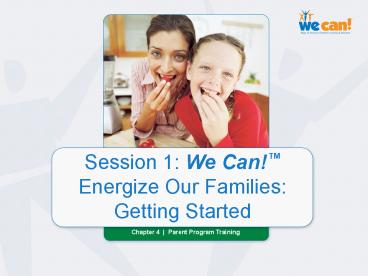Session 1: We Can! - PowerPoint PPT Presentation
1 / 17
Title: Session 1: We Can!
1
Session 1 We Can! Energize Our Families
Getting Started
Session 1 We Can! Energize Our Families
Getting Started
Chapter 4 Parent Program Training
2
Tell Us What You Think
- Evaluation Tool
- At the start Tell Us What You Think
- At the end Tell Us What You Think Now
- Full instructions for the Parent Program are in
the Leaders Guide - Helps you find out what parents know about
- Healthy eating
- Physical activity
- Screen time
- How these behaviors affect weight
3
Overview of Session 1
- Present objectives and overview of the Parent
Program - Discuss the increase in rate of overweight
- Explore the important role of parents
- Discuss healthy food choices how to increase
physical activity - Ask parents to share their goals expectations
4
We Can! Tip straight from the community
Make time for open-ended discussions Encourage
parents to share their goals expectations for
developing healthy family habits for eating and
physical activity. Boston Public Health
Commission (Boston, MA)We Can! City
5
Overweight A Growing Problem
- 66 of American adults are overweight or obese
- More than 16 of youth are overweight
- More than 15 of youth are at risk of becoming
overweight
6
Overweight in Children
There is an almost 80 chance that overweight
adolescents will become overweight adults.
7
Paying A Heavy Price
- Overweight
- ?
- serious health problems
- ?
- at a younger age
- ?
- shortened lifespan
8
Health Consequences
- High blood pressure
- High cholesterol
- Type 2 diabetes
- Cardiovascular disease
- Asthma
- Joint problems
- Sleep disorders
- Low self-esteem
- Poor body image
- Eating disorders
- Reduced mobility
- Reduced activity
- Isolation
- Weight issues into adulthood
- Early death
9
We Can! Tip straight from the community
- Help statistics hit home
- Share statistics on overweight and obesity from
your city or state to drive home the concern and
need to take action. - Central District Health Department
- (Boise, ID)
- We Can! General Community Site
10
Why the Increase in the Rate of Overweight?
Chapter 4 Session 1 Getting Started
- Attitudes
- Social influences
- Medical advice
- Environmental factors
- Genetic contributors
11
Reasons for Increase in Overweight
- Larger portions
- Eating out more
- More foods with added sugar
- More high-fat foods
- More screen time
- Less physical activity
12
Calories Consumed vs. Calories Burned
- Consuming more calories than burning
- Energy Balance requires taking in same amount of
calories (ENERGY IN) as burning (ENERGY OUT)
13
Parents Caregivers Are Key
The Parent Program targets parent/caregivers
because
- Parents have a major influence on their
childrens health
- The home is a primary source of nutrition for
children
- Parents are the household policymakers about
food, activity choices, screen time
- Parents can model healthy food choices
- Parents want more nutrition information
- Relatively few programs target families and the
home environment
14
The Challenges of Eating Healthier Being More
Physically Active
Chapter 4 Session 1 Getting Started
- Share challenges solutions
- Discuss other options
- Be a good role model
- Make gradual dietary changes
- Plan opportunities for your family to be
physically active together
15
Tips to Eat Well and Move More
- Eating Well Tips
- Drink water before a meal
- Eat off smaller plates
- Keep a regular eating
- schedule
- Dont skip breakfast
- Try a new fruit or vegetable
- Ask for salad dressing on
- the side
- Skip buffets
- Moving More Tips
- Walk your children to school
- Ask your children for help doing
- active chores around the house
- Go for a half-hour walk instead
- of watching TV
- Park farther from the store and
- walk
- Take the stairs instead of the
- escalator
16
We Can! Try Tips to Eat Well and Move More
Tracking Sheet
17
Quick as a Flash Healthier Snacks
Chapter 4 Session 1 Getting Started



















![READ[PDF] Session Notes, Referral Log, Supervision Notes & Group Notes PowerPoint PPT Presentation](https://s3.amazonaws.com/images.powershow.com/10086899.th0.jpg?_=20240727079)
![READ[PDF] Session Notes, Referral Log, Supervision Notes & Group Notes PowerPoint PPT Presentation](https://s3.amazonaws.com/images.powershow.com/10086898.th0.jpg?_=20240727079)










